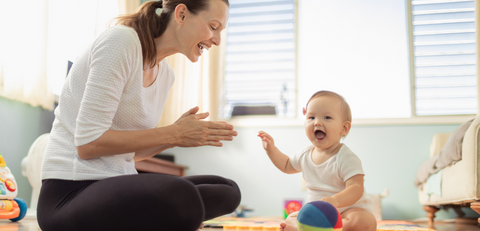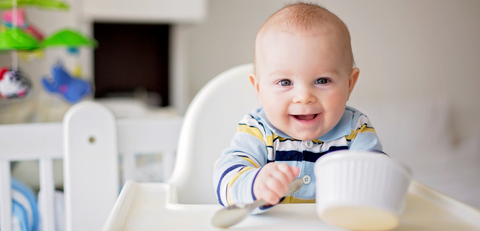Children bring joy. For sure, but outside of that they also bring chaos in many forms, and taming it's not always easy. One of the best ways to deal with it is daily rituals & routines. With the right routines in place, both your life and your child's will get a little easier.

From what age children get used to the daily schedule?
There's a consensus that an infant can get used to the daily routine from around 4-6 months of age.
It is advisable to establish a daily routine from birth as this helps to organise things better, however, by the age of 4-6 months you should not expect the baby to show signs of smooth adaptation to the daily routine. So if that's the case, don't panic.
This is because the baby is only getting used to life outside the womb and is not yet ready to recognise the daily patterns of events.

What are the daily routines for?
Routines and rituals have several purposes. Firstly, it is about ensuring that the baby gets the right amount of sleep, is fed properly, smoothly accepts the baby care procedures and usual daily activities.
The second goal is to meet the child's needs in such a way as to blend them into daily household life as seamlessly as possible.
Once you start looking around you'll find plenty of charts with the right daily routines for the children at certain development stages.
As much as it's very easy to describe the ideal daily schedule for the perfect child, in reality, we sometimes struggle to find a good compromise between what is desirable and what is possible.
You need to accept that there's gonna be a lot of try and error along the way as it takes a lot of persistence and adjustments to establish the routines which will work both for the child and the mother.

What do the daily routines consist of?
First, it’s important to see that the daily routine for such a young child is a bit like cubes of dominoes. Failure to complete one of the elements often results in a disrupted day and can cause problems in completing other elements which are all interconnected.

The usual daily routines focus on three main activities in babies life:
Sleeping
According to HSE children up until the age of 3 months the average child will need 9-18 hours a day, 12-14 hours a day at the age of 3- 6 months and then remains at around 12 hours from the age of 6 months up until 2 years.
Getting the right amount of sleep at the right times between meals will result in better digestion and extended, uninterrupted stretches of sleep, which means more sleep for parents at night.

So how to go about it then?
Start with simple things. Try to work out the bedtime that will be set in stone as much as possible and will work as a reference during the day.
Observe your baby's natural sleeping routine in response to daily activities such as bath time, walks, playtime or feeding and use it to your advantage.
Try to plan the daily activities in such a way as to get the baby to sleep at the planned times of the day.
Try to control the time of the last nap before bedtime, as the child may not be sleepy enough for bedtime.
Create a daily bedtime ritual. Observe and adjust to what works best.
It normally includes bath time, baby care procedures, putting on a sleepsuit and last feeding before bedtime. It could be little things that matter, a favourite soother, relaxing massage or cosy blanket can make all the difference to ensure a smooth sleep for the baby.

Feeding
In the past, experts gave parents strict guidelines on how often to feed their baby. Nowadays, it is considered better for the child to decide for him/herself on how much and how often to eat. If so, is there still room for any routine at all and does it have any benefit?

Absolutely!
A healthy feeding routine should be built around natural, existing feeding patterns as much as possible. The older the child gets the easier it should be to modify the routines to seamlessly include feeding in a routine daily schedule.
In the case of poor feeding, a well-structured daily feeding routine could help to improve appetite, however, that should only be established during a consultation with a medical professional.

What a feeding routine looks like?
0-4 months
At the first stage of a baby's life, feeding takes place on demand and there's not much room to change it. During that time your most important task would be to check if the child eats as much as it needs. You can observe a natural feeding pattern and try to plan around it.
If you are bottle-feeding your baby, finding the right formula and the baby bottle will be the first step. Infants have their preferences and finding the right teat and bottle sometimes requires trying out several types. If your baby is colicky, try using a specially designed anti-colic bottle. You can also check our other article: 12 Simple ways to soothe a colic baby

4-6 months
By that time you should be able to plan a bit more as the baby can start getting used to the patterns of the day.
At this stage, feeding should be gradually woven into the daily routine, you can try it at more regular times. Events such as activity time, walks, naps, and bath time should be integrated with feedings in such a way to ensure the feedings at more suitable times.

6-12 months
Once the solid foods are introduced your baby will test new textures and flavours
and you can go for a more structured meal schedule:
Usually feeding schedule would look like this:
- Wake up milk
- Breakfast
- Moring milk & nap
- Lunch
- Midday milk & nap
- Dinner
- Bedtime milk & sleep
As always it’s a matter of try and error to find the right timing.

Bathing & babycare
As you probably know, there’s no need to bathe the baby every day, however, it’s not banned contrary to popular believe, as long as they enjoy it. Main thing is to remember that it should be planned at a time when they’re not hungry or too tired.

Try to include baths as part of the bedtime routine, just make sure to give yourself enough time to complete all babycare procedures and manage the evening feeding before fixed bedtime.
Consistency is the key to success here. The more often you can keep the evening routine going at the same time, the better the child will get used to it. As a result, the child is also usually more willing to accept routine babycare, which does not always come easily.

Final word
Contrary to what others may think, establishing a routine that works takes time, patience and persistence. The most important thing is to observe, learn, not give up and in time, establishing a routine that works will surely happen. And when it will you'll see that it was one of your best invested time and effort as it will save you a lot of sleep and will give your child a sense of structure they can rely on.


